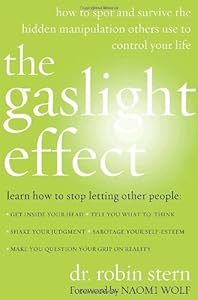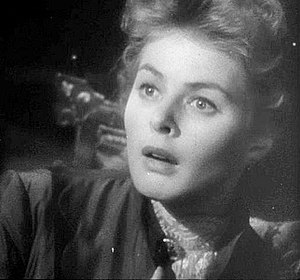“Pfft, I never said that. What are you talking about?”
“What did you do with my _____?”
“Settle down. You’re worried over nothing!”
If you’ve ever had anyone speak to you like you’re delusional when you know darned good and well that you’re not, you’ve been gaslighted.
The term comes from the 1938 play “Gas Light,” which was also produced as a movie in 1939 and again in its best-known version, the George Cukor film. Cukor’s 1944 MGM production featured Ingrid Bergman as the psychologically tortured wife and Charles Boyer as the conniving husband who wants her jewelry. Boyer’s character goes to diabolical lengths to convince his spouse that she’s gone off the deep end, including denying what she sees with her own eyes: the flickering gaslights he has deliberately dimmed.
Gaslighting entered the psychological lexicon several years ago, classified as a type of emotional abuse that often goes hand in hand with physical abuse. That’s how it happened for Hailey, one of the runaway women in my novel “Loop Dee Doo.”
Her domineering pig of a husband Derek is constantly telling her “you can’t do anything right.” A naysayer beyond skeptical, he accuses her of things she’s never done, of overreacting and underperforming. The consequences to her well-being are profound. She’s distraught, confused, thwarted by the smallest of obstacles, unable to make even minor decisions. The hormonal changes of menopause add forgetfulness to the fire. Sexual frustration combined with alcohol abuse allows her to justify in her own mind falling into a quartet of warped affairs. And in the end, sitting in a jail cell, she believes Derek: What other 49-year-old wife and mother sinks this low? To have hit such a sordid and humiliating bottom, she really must be off-her-rocker call-in-the-men-in-the-white-coats cuckoo.
“These are the same women who stay in relationships they don’t belong in, who don’t follow their dreams, who withdraw from the kind of life they want to live,” explains the author Robin Stern, Ph.D. in “The Gaslight Effect: How to Spot and Survive the Hidden Manipulations Others Use to Control Your Life.” Stern’s theories, which made quite a media splash when the book was first published, became the topic of a much-discussed 2011Current Conscience blog (http://thecurrentconscience.com/blog/2011/09/12/a-message-to-women-from-a-man-you-are-not-%e2%80%9ccrazy%e2%80%9d/). Of particular interest are the questions aimed at diagnosing whether you are a victim. For example, do you make excuses about your partner’s behavior to family and friends? Feel as though you can’t do anything right or are constantly second-guessing yourself? It’s time to look around at the relationships in your life – from bosses to husbands – and figure out if there are gaslighters in your midst.
Stern’s complete checklist can be viewed in her Psychology Today blog (http://www.psychologytoday.com/blog/power-in-relationships/200905/are-you-being-gaslighted).
My characters in “Loop Dee Doo” are gaslighted by men. In all fairness I note that women also commit the abuse; research indicates that the mother-daughter dynamic is particularly vulnerable to this life-altering malady from either side of the relationship.
The most extreme form of gaslighting is defined as deliberate psychological and environmental manipulation designed to drive a person insane. Some purists claim this is the only true manifestation. Others, me included, have witnessed the many forms of this abuse – a sort of Gaslight Affective Disorder, if you will – and observed that it can even be rendered on a subconscious level in a completely unintentional manner.
Chances are most of us have engaged in some form of gaslighting at one time or another. Blogger Elisse Stuart’s nightmarish entanglement illustrates the link between gaslighting and narcissism (http://elissestuart.wordpress.com/2008/09/22/gaslighting-a-narcissists-game/).
A literary example of inadvertent gaslighting comes from the character Marilla in L.M. Montgomery’s “Anne of Green Gables.” Marilla accuses Anne of losing a prized amethyst brooch. The newly adopted red-headed orphan insists that she did pick it up to admire it but replaced it on the pin cushion. Marilla insists that she must have taken it; there’s no other explanation. Eager to be released from her room so she can attend a much-anticipated church picnic, Anne concocts a dramatic tale about accidentally dropping the treasured family heirloom into the Lake of Shining Waters. Luckily the episode ends happily, with Marilla finding the brooch and both learning a valuable lesson about forced confessions.
In my novel “Loop Dee Doo,” Hailey is beginning to recognize her husband’s gaslighting for what it is. The words of a Canadian sailor form a confidence-building mantra: “You know more than you think you know,” he told her. Through personal reflection and supportive reinforcement from companions Trish and Bonnie, Hailey subjects the image of herself as an inept, inadequate and insufficient human being to a reality test. She realizes that Derek has made her feel that the things she wants, such as affection and patience, aren’t normal.
I’ve been gaslighted more times than I can count, by bosses, competitors and yes, even my dear siblings, children, parents and husband. In the latter case, Dayus Interruptus once accused me of losing all his underwear (!), which we later discovered he’d left on our boat in his duffle bag, in winter storage. I remember asking myself “Am I living in a parallel universe?” as he suspiciously interrogated me on the whereabouts of his boxers and briefs. It was ridiculous and infuriating. When we found his skivvies next boating season, he laughed it off. It will never be funny to me. Perhaps it is my karma for having subconsciously gaslighted others in the past?
During the research for “Loop Dee Doo” I developed my own strategy for combating gaslighting and other forms of emotional manipulation. As soon as possible I unplug the harmful script looping through my brain that is defending, explaining and otherwise uselessly squawking over something that really isn’t worth any time whatsoever. It sounds simple, but takes strength and practice. The biggest head games, after all, are those we play on ourselves.
Hailey is definitely moving on physically in her freedom run downriver. But part of her struggle in “Loop Dee Doo” is gaining emotional distance from a history of systematic gaslighting. And for that she will have to stand her ground.
Have you ever been gaslighted? What did you do to extinguish the abuse? Who are some other characters in literature who are the victims or perpetrators of gaslighting?
Related articles
- ‘Gaslighting’ Ended My Relationship: ‘He Knew He Was Caught Out In The Lie’ (VIDEO) (huffingtonpost.com)




A most informative piece!! Very interesting to finally be able to put a name to it: Gaslighting. I have totally been in those shoes to the point where I feel like I’m either going nuts or I need to start recording conversations on what was said. Very frustrating. And, I can totally relate to getting so frustrated when the other party blows it off. It means nothing to them. So what? They were wrong. No big deal. But it was an attack on you, and that you take personally.
I find myself doing the same thing as you when I have that useless squawking in my brain and I’m dwelling over people or stuff that really doesn’t matter or things I can’t change, and it really isn’t worth my time – I have to keep reminding myself to move on and let it go. I’ve done a LOT of moving on and letting things go this last year in various areas of my life. You have to unplug and blow things off because it is harmful if you don’t and it doesn’t do any good for anyone. Sometimes it’s just really hard.